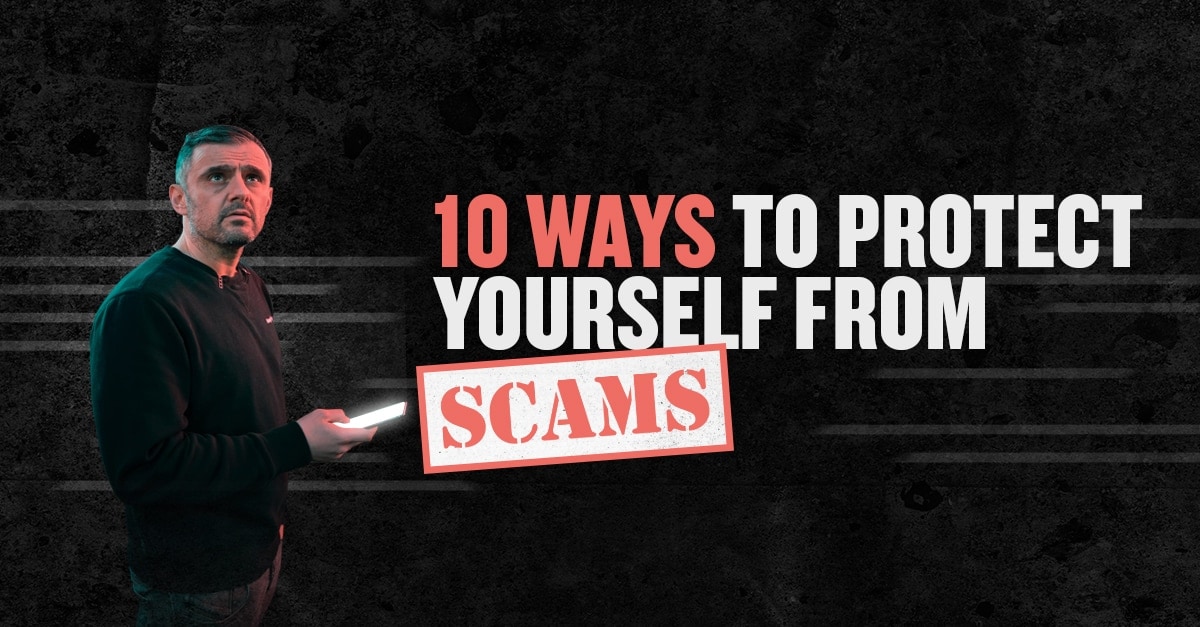Hey everybody. Before we jump into the article, I invite you all to check out my NFT project, VEEFRIENDS, which launched on Tuesday May 11th! My article, How to Buy Your First VeeFriends, will walk you through the concept behind the project as well as how to make a purchase. I also encourage you to join the Discord community – just a fun place to connect, hang out and ask your questions on all things VeeFriends. Hope to meet you there!
Team GaryVee here! 👋
With the launch of Gary’s NFT project quickly approaching, Gary really wants to ensure that his community is set up the RIGHT way. While we’re excited for 5/5, nothing is more important than making sure you are well informed and prepared to set up your wallets and accounts with maximum protection. Unfortunately, there are a number of shady characters on Discord and other social media platforms with malicious intent. These people impersonate Gary with fake but believable usernames and photos in an attempt to scam Gary’s community out of their personal info and money.
NEVER! https://t.co/L4J87ETK0B
— Gary Vaynerchuk (@garyvee) April 29, 2021
🚨 Please know that neither Gary nor anyone on Team GaryVee has ever or will ever reach out to you asking for your wallet seed phrase or private keys, nor will we ask you for money or your social security number. If you receive a DM, email or message of any kind asking for money or sensitive information, it is likely a scam! As always, be very cautious with any personal details you share.
Check out these resources on avoiding cryptocurrency scams from the FTC and Coinbase. For now, let’s jump into 10 tips to help protect yourself against scams, frauds and phishing attempts.
1. Never Send Money to Someone You Don’t Know
Of course, a request from a stranger asking for money, crypto or personal information is always a red flag. No matter what enticing offer they claim to have, it’s never a good idea to send your money to anyone you do not personally know.
2. Never Share Personal Information with Someone You Don’t Know
Some scammers won’t ask for money outright, but will instead request sensitive private information such as your address, phone number, bank account or credit card numbers or social security number. This information can be used to commit identity theft and should never be freely shared.
3. Never Assume the Name or Profile You See is the Right One
Many scammers are savvy enough to bypass the “stranger danger” roadblock by impersonating trusted or well-known figures. They will go as far as to use Gary’s name, the names of his companies or employees in messages to lure you into a false sense of security. Look beyond this name-dropping tactic and never assume that the source of the message is legitimate without verifying.



For reference, check out this article for a comprehensive list of all of Gary’s official social channels. If the name or username contacting you is not on this list, you can assume that it is not affiliated with Gary or any of the VaynerX companies.
4. Look Out for Spam Messages
If someone is spamming you with message requests aka repeatedly reaching out, be wary. Scam artists can be very persistent and will likely try to contact you several times on more than one platform or phone number. While we love engaging with the community, Team GaryVee will never harass Gary’s supporters with spam.
5. Always Verify Official Websites and Links
Like fake phone numbers and social media profiles, scammers will often create entire websites that look eerily similar to official sites on which you conduct business. Oftentimes, the URL address will be off by only a few letters or characters, and the site might even feature a passable replica of an authentic logo. These fraudulent sites will often be sent to you via email or text message, but be sure never to click on any suspicious links and to always carefully check the URL address. For instance, check this Coinbase anti-phishing resource to learn how to identify fake sites masquerading as the real cryptocurrency exchange.
In regards to getting set up for Gary’s NFT project, be sure that you only access the official Coinbase and MetaMask websites and apps.
6. Never Share Your Private Key or Seed Phrase
As covered in our article, How to Make a Cryptocurrency or NFT Wallet, private keys and seed phrases are like the golden keys to your crypto. They must never — ever — be shared, lost or left susceptible to discovery or theft. Sharing your public address is fine, but remember, if someone has access to your private key or seed phrase, they can steal your funds with ease. Take a look at this guide for secure seed phrase storage.
Many scammers will take advantage of people by asking them to verify their wallet address to win a prize or some other incentive. Do not fall for it.
7. Beware of Advance-Fee Schemes
Advance-fee schemes are fairly common with both traditional and cryptocurrency. In these cases, someone will ask you to send a sum of money or crypto in exchange for the promise of a greater reward later. Victims send funds willingly because they believe they are making an investment, only to see their money disappear.
8. Beware of Get Rich Quick Schemes
Generally, you want to be wary of any “opportunities” claiming to be able to get you a large sum of money quickly or overnight. As Gary often cautions, making investments in search of a quick buck is short-sighted and will often lead to disappointment. Be careful of falling prey to human greed — especially in the NFT world, where many early projects will fizzle out.
99% of NFT’s won’t be good investments and there will be some massive crashes in the next 12 to 24 months .. many will get confused and think it was a fad.. that’s when it gets really good .. this will be an interesting decade … oh and that 1% will be all-time returns
— Gary Vaynerchuk (@garyvee) February 28, 2021
9. Beware of Requests for Cryptocurrency, Wire Transfers or Gift Cards
Scammers will commonly offer enticing opportunities and require that you pay them in crypto, money transfers or gift cards. This is often an indication of a scam because these funds are almost always non-recoverable. Remember, stolen crypto is gone forever. There is no bank, government or other authority that can help you recover your funds, and scammers know that. If you receive this kind of request, don’t respond.
10. Beware of Covid-19 Scams
As of March, Americans had lost $382 million in Covid-related scams. These scams were tied to everything from vaccines to stimulus checks and unemployment benefits. Sadly, many scammers are preying on the vulnerability of people who are scared and looking for relief and answers during this difficult time. Stay vigilant and look out for scams using pandemic buzzwords as a way to extract money or information.
Reminders
- If an opportunity feels suspicious, inauthentic or too good to be true, it most likely is.
- Always back up your private keys/seed phrases in secure locations, and never share them with anyone, under any circumstances.
- Do not send money, crypto or sensitive personal information to people you don’t know.
- Never assume a website is legitimate. Always do your research and check for the official site, logo and URL address.
We know that so many of you are excited for Gary’s NFT project launch. Sadly, there are many people out there waiting to take advantage of that enthusiasm by setting traps. Please, remain vigilant for scams, secure your private information and use discernment when it comes to the people and companies with whom you do business. If you are ever unsure about the legitimacy of a text, DM or message claiming to be from Gary or his team, please do not hesitate to let us know so that we can flag suspicious activity. You can also report and/or block fake accounts on their respective platforms.
If you enjoyed this article, please share it on your favorite platforms and encourage others to stay safe and informed. Thank you!











